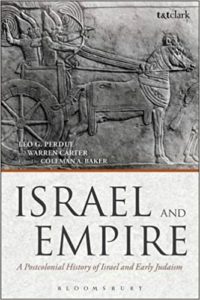PERDUE, L. G.; CARTER, W. Israel and Empire: A Postcolonial History of Israel and Early Judaism. London: Bloomsbury T&T Clark, 2015, 344 p. – ISBN 9780567243287.
Diz a editora:
Israel and Empire introduces students to the history, literature, and theology of the Hebrew Bible and texts of early Judaism, enabling them to read these texts through the lens of postcolonial interpretation. This approach should allow students to recognize not only how cultural and socio-political forces shaped ancient Israel and the worldviews of the early Jews but also the impact of imperialism on modern readings of the Bible.
Perdue and Carter cover a broad sweep of history, from 1300 BCE to 72 CE, including the late Bronze age, Egyptian imperialism, Israel’s entrance into Canaan, the Davidic-Solomonic Empire, the Assyrian Empire, the Babylonian Empire, the Persian Empire, the Greek Empire, the Maccabean Empire, and Roman rule. Additionally the authors show how earlier examples of imperialism in the Ancient Near East provide a window through which to see the forces and effects of imperialism in modern history.
Sumário:
1. Beginnings
2. The Crisis of the Late Bronze Age and the Spawning of New Empires and Kingdoms (1250-1150 B.C.E.).
3. Egyptian Imperialism: The Origins of Ancient Israel in Egypt (LBA)
4. Liberated Colonies and the Formation of a Tribal Nation: Israel’s Entrance into Canaan and the Period of the Judges (Iron I)
5. Imperialism in Early Israel: The Davidic-Solomonic Empire (1000-922 B. C. E.)
6. Imperialism: The Establishment of the Northern Empire (922-722 B. C. E.)
7. Imperialism: The Assyrian Empire (745-612 B. C. E.)
8. Imperialism: The Babylonian Empire (612 – 539 B. C. E.)
9. Imperialism: The Persian Empire (539-332 B. C. E.)
10. Imperialism: The Greek Empire (332-164 B. C. E.)
11. Postcolonialism: the Maccabean Empire (164-63 B. C. E.)
12. Neo-Imperialism: The Roman Rule of Judea in the Late Republic (65 B. C. E.) and the Subsequent Empire (30 B. C. E.-72 C. E.)
Em um artigo, publicado na revista Estudos de Religião, vol. 28, n. 1 (2014), da UMESP, sob o título Hermenêutica bíblica: refazendo caminhos, José Ademar Kaefer diz sobre a hermenêutica pós-colonial:
Hermenêutica pós-colonial tomou forças no final do século XX, a partir, principalmente, dos estudos pós-coloniais nas antigas colônias que haviam passado por um recente movimento de independência, mas não se restringe a isso. É um movimento anticolonial e tem como foco a crítica à razão pós-colonial. Nenhum colonialismo se constrói fora de si. O colonizador constrói a si mesmo quando coloniza. Constrói a si e exclui o colonizado. Por isso é colonialismo. Quando sai da colônia, o colonizador não a deixa de fato, pois permanece aí sua filosofia, teologia, história, modo de organizar a sociedade etc. Ele desconhece, fecha-se e destrói outro modo de sociedade. Portanto, o colonizado não se tornou independente de fato. Ele continua dependente do modo de pensar do colonizador: “Pode um subalterno falar”? Portanto, é preciso descolonizar o modo de pensar, partindo da geopolítica, da corpopolítica, da interculturalidade e da alteridade, um pensar entre lugares. Descolonizar a partir de grupos culturais de lugares e do diálogo entre a diversidade. A hermenêutica bíblica pós-colonial tem raízes na teologia da libertação, mas se diferencia desta por sua internacionalidade. Enquanto que na teologia da libertação o campo de ação é predominantemente a partir dos empobrecidos da América Latina e Caribe, na teoria pós-colonial são os excluídos do mundo a falar da periferia do mundo.
